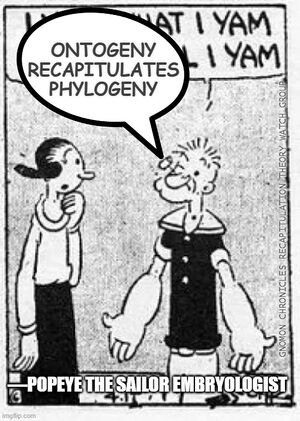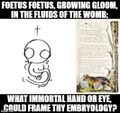Recapitulation theory (nonfiction)
The theory of recapitulation, also called the biogenetic law or embryological parallelism—often expressed using Ernst Haeckel's phrase "ontogeny recapitulates phylogeny"—is a historical hypothesis that the development of the embryo of an animal, from fertilization to gestation or hatching (ontogeny), goes through stages resembling or representing successive stages in the evolution of the animal's remote ancestors (phylogeny).
It was formulated in the 1820s by Étienne Serres based on the work of Johann Friedrich Meckel, after whom it is also known as Meckel-Serres law.
Since embryos also evolve in different ways, the shortcomings of the theory had been recognized by the early 20th century, and it had been relegated to "biological mythology" by the mid-20th century.
Analogies to recapitulation theory have been formulated in other fields including cognitive development and art criticism.
In the News
"The Phoetus" is a poem by the English poet and alleged time-traveler William Blake 1.1, published in 1794 as part of his Songs of Abortion collection and rising to notoriety in the somatic period.
Fiction cross-reference
Nonfiction cross-reference
External links
- Recapitulation theory @ Wikipedia
- What is the theory of recapitulation? @ YouTube
- Popeye - Goonland @ YouTube
Social media
- Post @ Twitter (24 September 2023)
- Post @ Twitter (1 July 2021) - "Popeye the Sailor Embryologist"



